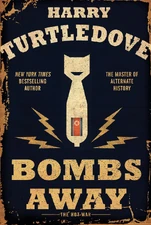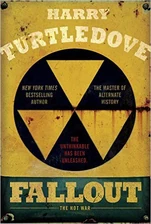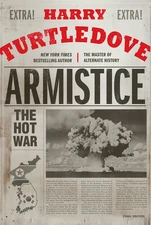| Istvan Szolovits | |
| Fictional Character | |
| The Hot War POD: November, 1950 | |
| Appearance(s): | Bombs Away; Fallout; Armistice |
| Type of Appearance: | Direct POV |
| Nationality: | Hungary (resident of the United States commencing in 1952) |
| Date of Birth: | c. 1930 |
| Religion: | Judaism |
| Occupation: | Soldier, delivery driver |
| Military Branch: | Hungarian People's Army (World War III) |
| Professional Affiliations: | Blue Front |
Istvan Szolovits[1] (b. ca. 1930) was a soldier in the Hungarian People's Army during World War III. He was a Jew, which made him something of an odd man in his unit.
Szolovits and his unit were mobilized after the United States and the Soviet Union traded atomic bomb attacks between 23 January and 1 February 1951. Like many soldiers in Soviet satellite countries, Szolovits was armed with a variety of Soviet second-hand weapons and equipment.[2] The unit made its way west. Szolovits was a frequent target of Sgt. Gergely, who'd survived World War II and the purges of the communist government of the Hungarian People's Republic.[3]
On 15 February, Szolovits's squad was positioned just outside Schmalkalden, East Germany, ready to cross the border. Word came that the U.S. had used atomic bombs against several Eastern European cities, including the Hungarian city of Szekesfehervar. It fell to Szolovits and his fellow private Tibor Nagy to calm down a soldier who'd hailed from Szekesfehrervar. The way he handled the task impressed Sgt. Gergely.[4]
His squad went into West Germany two days later. The Hungarians were used to occupy areas the Soviets had already taken. A week after the invasion, Szolovits' squad was assigned to Schweinfurt. They were warned against fraternization, and were subject to sneak attacks by the locals. The Hungarians used the tactic of seizing hostages and executing them when attacks took place. Nagy and Szolovits were both assigned to periodic firing squad duties. Nagy hated it; Szolovits hated it more, as the this was tactic used by the SS during the last war.[5]
By April, Szolovits and his squad had seen combat. As they prepared for another attack, Szolovits found himself alone with Nagy. Szolovits quietly suggested that they surrender the first the chance they got. Nagy dismissed the idea, and warned Szolovits against anymore such talk.[6] Nagy was killed not long after.[7] Ironically, this proved something of a benefit for Szolovits; Gergely informed him that Nagy had been next in line for a promotion to lance corporal but now it would be him. Szolovits didn't particularly trust Gergely, but he did accept the promotion.[8]
By April, the Hungarian troops were fighting side by side with Polish troops. Despite their status as "fraternal socialist allies", the situation had the potential for conflict as Poland had been overrun early in World War II, and Hungary had been a Nazi ally. Nonetheless, the Magyars and the Poles were able to communicate with the German language, and some level of comradery.[9]
In May, Szolovits was increasingly disenchanted with the war. After surviving an American mortar barrage, Szolovits had the unpleasant task of mercy-killing a Polish soldier who had been horribly mutilated by a shell. He even tried to shrive the Pole before slitting his throat. Sgt. Gergely approached Szolovits, and asked him to do the same thing for Gergely if Gergely were so injured.[10] A few weeks later, Szolovits was fighting in the Ruhr, astonished that he was still alive, and still contemplating surrender if the opportunity arose.[11]
In June 1951, Szolovits and his unit were located in the destroyed town of Raesfeld, in the Dämmerwald, which itself had been ruined.[12] Raesfeld was held by the Russians. American troops were able to use the Dämmerwald, ruined though it was, to pick off Russian officers.[13]
By July, the Soviet's were moving west again, and their allies were moving with them, including Szolovits, who still wanted to surrender. Unfortunately, in the heat of battle, this proved difficult. During a drive, Szolovits came across two American soldiers. He reflexively killed one, and the other immediately surrendered. Szolovits felt bad about the dead American, but had no compunction about taking any cigarettes he could find from the body, some of which he shared with Sgt. Gergely.[14]
A few days later, Szolovits was astonished when the Allies only set out rear guards to meet the Soviet advance. Gergely suggested that perhaps the Allies were finally on the run, and Szolovits agreed.[15] That night, however, as he slept in a trench, a U.S. dropped an atomic bomb on the Soviet positions in Wesel.[16] While the Hungarians were not caught directly in the blast, their position was hit by the shock waves and radiation. Szolovits' face was seared by the initial flash of the detonation, then he was thrown around by the overpressure, but he survived without serious injury. He then went about helping his comrades, and soon an order came for a retreat. Both Gergely and Szolovits wondered how many Russians had survived the attack.[17]
With the Soviet Bloc's forward positions destroyed, Szolovits and his comrades were in retreat eastward from the Ruhr throughout September, 1951. Aside from his burned face, he avoided the radiation sickness a number of his comrades suffered. In the meantime, his orders were to help make the Allies pay for every piece of ground they took back, even though he really didn't want to kill Americans.[18]
Szolovits found himself under almost perpetual bombardment as he retreated.[19] Finally, Szolovits was captured by the Americans, and sent back behind the lines. He was relieved to have escaped the war.[20] He was transferred to a POW camp outside of Lyon, France, which housed a number Hungarians and other Soviet allies. The senior Hungarian officer was a colonel named Bela Medgyessy, who seemed unenthusiastic about Szolovits' status as a Jew. Still, Medgyessy gave Szolovits the lay of the land, and further drafted Szolovits onto the football team the Hungarians had put together.[21]
Unfortunately, Szolovits came to the attention of another prisoner named Miklos, a former member of the Arrow Cross Party. After a quick vicious fight, Szolovits soundly beat Miklos, and won some respect from the other prisoners.[22] That bit of business settled, Szolovits began the process of adopting to the routine being a prisoner. He was astonished that the Americans fed their prisoners better than his own country had fed its soldiers, and wondered how the Soviet Union and their allies could hope to win.[23]
Szolovits soon proved he was a good football player in a February match with the Czechoslovkian team. He earned his fellow prisoners' respect.[24] He also caught the eye of U.S. intelligence. In April 1952, he and Miklos were approached by Captain Imre Kovacs, a Hungarian-American Jew. The two met with officers in the camp's administrative center. Miklos was sent to another room, but Kovacs met with Szolovits personally. Szolovits freely admitted he was not a devout communist, something Kovacs had heard from other Hungarians.[25] Kovacs questioned Szolovits about the unrest in Hungary, although Szolovits actually knew very little.[26] In the meantime, for lack of anything better to do, Szolovits kept playing foot ball.[27]
In the aftermath of the ceasefire in Europe, Kovacs approached Szolovits and informed him that he'd been given asylum in California.[28] He was placed in Westwood, Los Angeles. After undergoing a last interrogation in July, 1952,[29], he was given a green card, money, and the contact information for Herschel Weissman, owner of Blue Front. He also learned that Sgt. Gergely had also survived and defected to the U.S. Szolovits began working at the Blue Front the next day under the supervision of Aaron Finch, who quickly showed him the ropes.[30] Szolovits bought a cheap car, and began learning to drive. He also socialized with Aaron Finch's family.[31] In short order, he realized that the U.S. was much freer than Hungary had been, but that its people were not always equal.[32]
In September 1952, Szolovits had one last encounter with Sgt. Gergely, who showed up at Szolovits' apartment in the dead of night, uninvited. Gergely confirmed that Szolovits was at least partially responsible for his own status as a U.S. resident. Szolovits finally learned that Geregly's first name was "Erno". Szolovits told Finch about it the next morning.[33] He began classes in English and English Lit at the Pasadena Junior College, and became friendly with a fellow student named Gina.[34]
References[]
- ↑ In Bombs Away, he is introduced as Isztvan Szolovits. Beginning with Fallout, he suddenly loses a z and becomes Istvan.
- ↑ Bombs Away, pg. 66.
- ↑ Ibid., pgs. 66-67.
- ↑ Ibid., pgs. 105-109.
- ↑ Ibid., pgs. 123-124.
- ↑ Ibid., pgs. 226-228.
- ↑ Ibid., pg. 228-229.
- ↑ Ibid., pgs. 252-255.
- ↑ Ibid., pgs. 294-298.
- ↑ Ibid. pgs. 333-337.
- ↑ Ibid., pgs. 394-397.
- ↑ Fallout, loc. 488.
- ↑ Ibid., loc. 503.
- ↑ Ibid, loc. 1062-1136.
- ↑ Ibid., loc. 1751-1765.
- ↑ Ibid., loc. 1765.
- ↑ Ibid, loc. 1765-1811.
- ↑ Ibid., loc. 2772-2829.
- ↑ Ibid., loc. 3446-3470.
- ↑ Ibid., loc. 3481-3506.
- ↑ Ibid., loc. 4267-4291.
- ↑ Ibid., loc. 4291-4316.
- ↑ Ibid., loc. 4328.
- ↑ Ibid., loc. 5243-5300.
- ↑ Ibid., loc. 5842-5916.
- ↑ Armistice, pgs.35-38, ebook.
- ↑ Ibid., pgs. 62-65.
- ↑ Ibid., pgs. 131-133.
- ↑ Ibid., pgs. 149-153.
- ↑ Ibid., pgs. 212-219.
- ↑ Ibid., pg. 268-272.
- ↑ Ibid.,pgs. 287-288.
- ↑ Ibid., pg. 298-301.
- ↑ Ibid., pgs. 362-365.
| |||||||||||||||||||||


